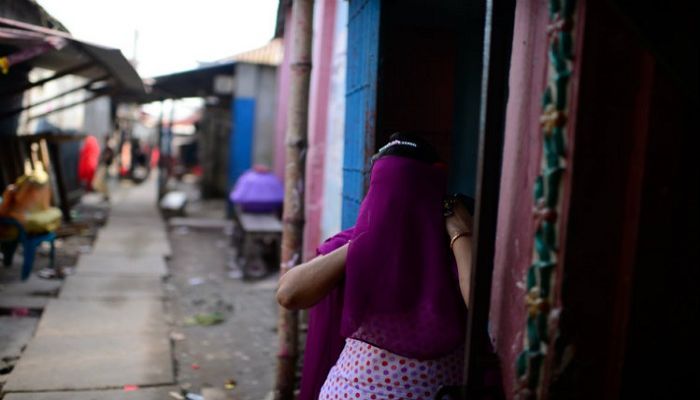
Bangladesh Sex Workers Finally Get Honourable Funerals
Desk Report
Published: 12 Feb 2020, 05:38 pm

Hamida Begum became the first sex worker to obtain a traditional Islamic funeral from a brothel in Daulatdia, shattering a longtime ban in Bangladesh's Muslim majority where prostitution is legal but deemed by many to be immoral.
Scores of women assembled at the cemetery, crying for the death of the 65-year-old but also for the monumental achievement marked by her burial.
"I never thought she would have such an honourable farewell," said the daughter of Begum, Laxmi, who followed her mother into the company.
"My mother was treated like a human being," she added.
Islamic spiritual leaders have turned down funeral services for sex workers for decades because they see trafficking as unethical.
When Begum died, her family planned to place her in an unmarked grave — standard practice for women like her — but a coalition of sex workers persuaded the local police to talk to religious leaders to give her a proper burial.
"The Imam was initially reluctant to lead the prayers, but we asked him whether Islam forbids anyone from engaging in a sex worker's Janaza (funeral prayers), and he had no response," local police chief Ashiqur Rahman said, who supervised the negotiations.
Stigma and shame
Bangladesh is one of the only Muslim countries in the world where prostitution is legal for women aged 18 or over and staff are required to hold an adult license and agree to the job.
The truth is more bleak, NGOs have reported finding girls as young as seven to be groomed to sell sex, and warning that child trafficking is on the increase for the industry.
Officers are often suspected of corruption — taking bribes from pimps and brothel-owners to give girls even younger than 18 a credential.
Begum was just 12 when she started sex work in Daulatdia where more than 1,200 women and girls cater for up to 5,000 customers a day.
The site, one of the country's approximately 12 legal brothels, is a series of shacks spread over a warren of alleyways some 100 kilometers west of Dhaka.
Near to a popular intersection between road and rail, it is frequented by local and long haul vehicles as well as passengers.
The brothel was established a century ago under British colonial rule, but moved to its current location, near a ferry station, after locals torched the old complex in 1988.
The sex workers and hundreds of their children live in concrete and tin shanties on a sandbank of the river Padma -- often paying exorbitant rents to unscrupulous landlords.
For those forced into the trade, they can only leave when they've paid off inflated and exorbitant 'debts' to the pimps and madams that bought them
Even if this is possible, the stigma surrounding sex work means that many feel there is nowhere else to go.
Buried like dogs
For decades, when one of them died their bodies would be thrown in the river, or buried in the mud.
Local authorities provided some wasteground for unmarked graves in the early 2000s, and families would compensate drug addicts for burials — typically without organized prayers in the evenings.
"If we wanted to bury the dead in the morning, villagers would chase us with bamboo sticks," recalled Jhumur Begum, who heads a sex workers group.
"It was as if a dog has died," said former sex worker Nili Begum, now a grandmother who lives in the brothel where her daughter now works.
But there are hopes that Begum's funeral will change things for all women in the brothels.
The religious ceremony was attended by more than 200 mourners while another 400 went to the post-funeral feast and prayers, police chief Rahman remembered.
"It was an unprecedented scene. People waited until late in the night to join the prayers. The eyes of sex workers welled up with tears," he added.
Local authorities, councillors and regional police leaders backed his effort "to break this discriminatory taboo," he said.
Hamida Begum's 35-year-old daughter, who operates from the two-room shanty that her mother bought with her savings, said: "I hope from now on every woman who works here, including me, gets a Janaza just the way my mother did," she said.
Jalil Fakir, a village councillor who attended the service, said the funerals for sex workers would go on in a bid to give fairer treatment in death.
"After all, who am I to judge her. If she has committed any sins, it will be Allah who will judge her in the afterlife, not any of us," he said.
Source: AFP